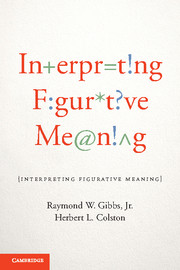Book contents
- Frontmatter
- Contents
- 1 Introduction
- 2 Identifying Figurative Language
- 3 Models of Figurative Language Comprehension
- 4 Interpreting Specific Figures of Speech
- 5 Indeterminacy in Figurative Language Experience
- 6 Factors Shaping Figurative Meaning Interpretation
- 7 Broadening the Scope of Figurative Language Studies
- References
- Index
3 - Models of Figurative Language Comprehension
Published online by Cambridge University Press: 05 June 2012
- Frontmatter
- Contents
- 1 Introduction
- 2 Identifying Figurative Language
- 3 Models of Figurative Language Comprehension
- 4 Interpreting Specific Figures of Speech
- 5 Indeterminacy in Figurative Language Experience
- 6 Factors Shaping Figurative Meaning Interpretation
- 7 Broadening the Scope of Figurative Language Studies
- References
- Index
Summary
The experimental research on figurative language comprehension is often difficult to categorize because of the diverse ways scholars describe their work and its theoretical implications. Several researchers clearly aim to present broad models of figurative language comprehension and attempt to show how their specific theories can possibly explain understanding of many different kinds of tropes. Even if these research programs do not always provide empirical evidence related to each kind of figurative speech typically studied in the field, there is still an overt attempt to apply the findings of various empirical tests to broader conceptions of how figurative language, and language in general, is comprehended. There are other researchers, however, who typically focus on one or two tropes in their empirical studies. Although this latter group of psycholinguists does not usually provide full-scale models of figurative language comprehension, they sometimes suggest how their empirical findings bear on enduring issues in the study of figurative language processing. Finally, there are scholars, and their empirical studies, that focus exclusively on specific tropes and aim only to construct theories appropriate for understanding those figures. It should also come as no surprise that some psycholinguists flow back and forth among these various research strategies, and summarizing these scholars’ contributions can be challenging.
Our aim in this chapter is to evaluate different traditional and contemporary models of figurative language comprehension. The emphasis here is on research that bears on general issues related to the ease or difficulty of comprehending figurative language as a general form of linguistic meaning. Following the traditional belief about differences between literal and figurative language (see Chapter 2), psycholinguists have focused a great deal on examining the possibility that figurative language is understood after some sort of preliminary, default analysis of an expression's literal meaning. Psycholinguistic research over the past 40 years, however, has struggled to create adequate accounts of sentence parsing, and discourse processing, even for so-called literal language. Although there has been significant progress in the study of different aspects of online sentence processing in regard to specific topics (e.g., the interaction of syntax and semantics in sentence parsing, reference assignment, ambiguity resolution, establishing coherence relations in text), there is no single, coherent agreed-on position as to what people ordinarily do when they encounter language word-by-word in speech and reading. Thus, there is not one single position on so-called literal meaning processing, even among scholars who embrace traditional views of literal meaning. This state of affairs highlights some of the problems with theories of interpreting figurative meaning that are based on unverified assumptions as to how so-called literal language is usually understood.
- Type
- Chapter
- Information
- Interpreting Figurative Meaning , pp. 58 - 127Publisher: Cambridge University PressPrint publication year: 2012



